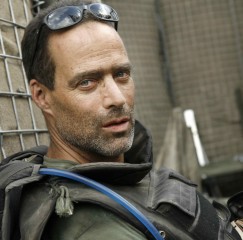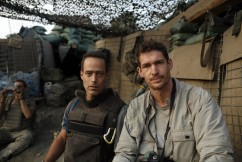Sebastian Junger

Sebastian Junger is the author of The Perfect Storm, which spent over three years on the New York Times bestsellers list—and was the basis for the motion picture starring George Clooney. He also is the author of New York Times bestsellers Fire, and A Death in Belmont, is a contributing editor to Vanity Fair, and has been awarded a National Magazine Award and an SAIS Novartis Prize for journalism. His most recent book, WAR, a New York Times bestseller that follows a single platoon based at a remote outpost in the Korengal Valley of eastern Afghanistan, was released in May 2010. Sebastian’s time in the Korengal Valley is also the subject of the documentary Restrepo, which Sebastian directed with award-winning photographer Tim Hetherington. Restrepo won the 2010 Grand Jury Prize for documentary at Sundance and was released theatrically as a National Geographic Entertainment presentation of an Outpost Films Production in June. Its worldwide television premiere on the National Geographic Channel will take place this fall. Check out Sebastian’s work, connect with the soldiers profiled in the WAR and Restrepo, and interact with other readers via Sebastian’s community site, Twitter and Facebook.

Sebastian Junger in the Korengal Valley, in Afghanistan.
First, Sebastian, let me congratulate you and Tim Hetherington on an amazing double-whammy, WAR and the documentary, Restrepo. I don’t think I’ve ever seen anything like them, separately and collectively. Great, great stuff that puts the reader and viewer right in the lap of some pretty hairy shit. Tremendous work.
Now my first question: How did the idea for War and Restrepo originate? I know you and Tim did it initially on assignment for Vanity Fair, but what was its genesis before that? You and Tim? An editor? How did the project evolve once you got into it? Did your original concept hold steady all the way—or did you have to re-evaluate and reshape the material once you realized what you actually had?
I decided to write a book and shoot a documentary about one platoon, after an embed with a battle company (same unit) in Zabul Province, in 2005. The Vanity Fair assignment was simply a way to pay for it. When Tim came on board on my second trip (September ’07), the documentary became a realistic possibility. Tim and I were continually shaping the film but always had in mind to only show the soldiers’ perspectives.
How did the shape of WAR evolve? As a writer of fiction, I can control the material because I’m making it up. But what you were doing with WAR came directly from real life and couldn’t be laid out in advance (or could it?). When you finally sat down to put it all together, how exactly did the book reach its final shape? What was the process?
A strictly linear narrative was not going work, so I decided to organize the material by theme—what I understood to be the primary emotional experiences of combat.
Are there any themes that you’ve seen throughout your Afghanistan reporting, since 1996? If yes, which ones?
No that structure really was just for the book.
How do you decide what project you’ll tackle next? Your books—The Perfect Storm, Fire, A Death in Belmont—show a broad range, but yet they’re tied together, too. Is there an ongoing theme or arc that unifies your work? Are you pursuing something specific, according to a vision or plan, or does the next project just pop up and seize you?
Frankly, I’m not sure exactly what it is about a project that makes me devote several years to it. All three “real” books had a personal relevance, though. In this case, Afghanistan was a country I’d been reporting on since 1996.
Why did you first choose to start reporting about Afghanistan in 1996, before we sent troops there post-September 11, 2001, and well-before more mainstream news outlets started putting more of a focus on it?
I wanted to write about the terrorist training camps in the Tora Bora mountains. They were sending fighters into Kashmir and Chechnya, and I thought it was the beginning of a larger problem.
Here’s a real writer’s question: what weight do you give to commercial considerations when you’re deciding what book to do next? Do you have a sit-down with your agent and editor? Do you talk hardball on the subject of, “Is this sucker gonna sell?” Or do you follow your heart and go with what grabs you? Is there a balance you try to strike?
Almost zero. The war in Afghanistan was definitely not a hot topic, commercially, but it meant a lot to me personally
Why?
I’ve just found myself affected by the experience and moved by the struggles of that country. Massoud was a very inspiring figure to me a well.
When you evaluate the commercial prospects of a project-in-waiting, what criteria do you use? (For me it’s total guesswork.) Do you have a sense, before you tackle a new book or film, of whether it will appeal to your audience?
I think it all depends on the execution. In the 90’s, a book by Dava Sobel, about longitude, was a bestseller.
Who is your audience? Do you have a sense of your own readership—and your own “brand?” If so, how did you evolve this? Do you think about it at all?

'Restrepo' film directors Sebastian Junger (left) and Tim Hetherington (right) at the Restrepo outpost in the Korengal Valley, Afghanistan. Junger and Hetherington jointly directed, filmed and produced the movie 'Restrepo' from June 2007 to January 2010. Korengal Valley, Afghanistan. September 2007. Photo credit: ©Tim Hetherington, www.timhetherington.com
I try to have as wide an audience as possible. I assume that if I do my job well, every person is a potential reader.
One of the qualities I love about your writing style is that, though it seems journalistic and fact-based (as opposed to novelistic or polemic), it’s capable of producing not just tremendous emotion but of expressing a very strong point of view without overtly “delivering a message.” This is a real art. Can you speak for a minute about your style. Have you deliberately evolved it over time? What inner criteria are you applying when you self-evaluate a page or a chapter? When a piece is really cooking, what exactly is working?
I’m a professional observer. I try to understand how things work and what they feel like to experience. Then I take those ideas home and try to turn them into words. Each sentence and paragraph has to have the right rhythm, word choices must be original and metaphors must be exactly right. I know I’ve done it right when I pick up something I’ve written and can’t stop reading it. That’s the same criterion I use, obviously, with other peoples’ writing as well.
Sebastian, you’ve already produced a terrific body of work and I’m sure that, by the time you’re done, you’ll have left us with a powerful shelf-ful of books and films. How do you view your work—and yourself as a writer and filmmaker—over the long haul? If we look at Bruce Springsteen, say, or Bob Dylan, we can see careers that have great variety but also are unified by powerful themes, even obsessions. Does one specific theme drive you? What do you hope to accomplish as an artist by the time you hang up your spikes?
I want to amaze people with the lives of others. I want to promote a broad sense of human equality. And, I want to communicate the idea that the experiences of all people have value and can be learned from.
What’s next? Will you blab—or are you superstitious?
No idea. I haven’t thought that far ahead.




Sebastian’s timing on his book and movie is excellent – Afghanistan is certainly a hot topic these days!
Steve,
A masterful interview that captured Sebastian’s writing style and provided a solid back story to these two excellent works.
I’m intrigued that Sebastian stepped off the audience/niche bandwagon. I think there is wisdom in looking at a broader audience – while at the same rme avoiding mediocrity and the LCD.
War….Perhaps one of the best (so far) written about Soldiering in Afghanistan. SJ looks into the souls of the many of the 11B’s in the PLTN of Battle Company/173rd ABN.
No doubt the book will make alot of money..and the documentary..perhaps even more. I understand SJ has dedicated a portion of the proceeds to a Soldier benefit program to assist those like the Soldiers written about and filmed in the Korengal.
History will only validate the “why”..but to those who fought in that valley…the glory is all theirs..and only theirs. What ever the Soldiers do either in the military or as they transition into civilian and “normal” life…the history of the Korengal will be a significant part of history of our involvement in the Korengal Vally.
Paktia/Khost Province-2003